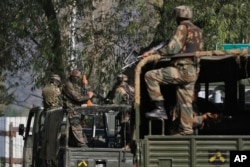The Indian army has accused Pakistani forces of killing two of its soldiers and mutilating their bodies along the border in the disputed Kashmir region.
India has vowed retribution for the incident that will deepen tensions between the South Asian rivals, whose relations have hit a low point in recent months.
The army said the soldiers were killed on patrol when Pakistani forces fired rockets and mortars at two Indian posts in the Krishna Ghati sector Monday.
"In an unsoldierly act" the bodies of two soldiers were mutilated, an army statement said. The army said that "such despicable act of Pakistan Army will be appropriately responded."
The Pakistani army dismissed the Indian army's accusations of mutilating the soldiers' bodies, calling them "false" and said it did not commit any cease-fire violation.
This is not the first time that the Indian army has accused Pakistani soldiers of mutilating the body of a soldier; it leveled a similar charge last November.
Cross-border gunfire leading to the deaths of soldiers and civilians on both sides has intensified along the Kashmir border since last September, when relations plummeted following an attack on an Indian army camp that killed 17 soldiers. Both sides blame each other for the firing.
It is not just the heavily militarized border dividing Kashmir between the two countries that is volatile. Violence has also spiked in Indian Kashmir, where New Delhi is grappling with escalating street protests against Indian rule and militant attacks.
On Monday, authorities in the Kashmiri capital, Srinagar, said five policemen and two bank officials were killed when militants ambushed a bank van in Kulgam district and made away with bundles of cash.
Last week, three Indian soldiers were killed in an attack by militants on an army camp in Kashmir.
While India points the finger at Pakistan-based Islamic terror groups for fomenting violence in Kashmir, Islamabad strongly denies it.
On Monday, after holding talks with visiting Turkish President Recep Tayyip Erdogan, Indian Prime Minister Narendra Modi said all countries need to work as one to "disrupt the terrorist networks and their financing and put a stop to cross-border movement of terrorists."
Modi added, "They also need to stand and act against those that conceive and create, support and sustain, shelter and spread these instruments and ideologies of violence."
Ahead of his visit, the Turkish president told a television news channel that both countries should engage in a multilateral dialogue to resolve their dispute over Kashmir.
An Indian foreign ministry spokesman said that New Delhi had told Erdogan that "the issue of Kashmir is essentially an issue of terrorism."
Peace talks between the two countries have remained stalled as New Delhi says it cannot hold talks until terrorism ends, while Islamabad has stressed the need for negotiations to resolve the decades-old dispute over the Himalayan region.
VOA's Ayaz Gul contributed to this report.





